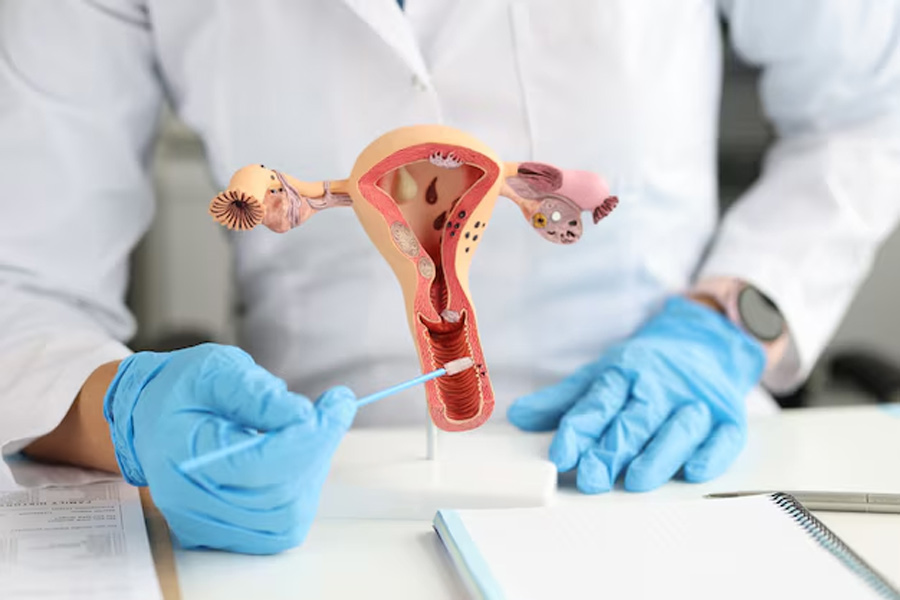
Planning a pregnancy involves taking proactive steps to protect your health and fertility. One critical yet frequently overlooked aspect of preconception care is cervical cancer prevention. As one of the most preventable forms of cancer, adopting preventive measures before conception can greatly lower the risk.
Notably, the incidence of cervical cancer during pregnancy has risen in recent years, possibly due to individuals choosing to have children later in life, as the likelihood of developing cervical cancer increases with age.
According to the American Cancer Society, cervical cancer is most frequently diagnosed in individuals aged 35–44, with the average age of diagnosis being 50. To provide deeper insights into this topic, we consulted Dr Jyoti Ranjan Swain, Consultant in Surgical Oncology at HCG Panda Cancer Hospital, Cuttack, who shared expert advice on cervical cancer prevention before pregnancy.
Cervical cancer originates in the cells of the cervix, the lower section of the uterus that links to the vagina. The primary culprit behind cervical cancer is a persistent infection with high-risk types of the Human Papillomavirus (HPV), a widespread sexually transmitted disease.
Dr Swain said, “Although the immune system typically clears most HPV infections, some cases may result in abnormal changes to cervical cells, which can progress to cancer over time.”

Fortunately, cervical cancer is highly preventable with the adoption of appropriate preventive measures.
Don't Miss: Prefer Natural Delivery Over C-Sec? 7 Steps To Prepare For The Same, As Suggested By Gynaecologist
Cervical cancer is both highly preventable and treatable when detected early. Dr Swain shared key recommendations for women planning a pregnancy to safeguard their health and reduce cervical cancer risk.
Routine cervical cancer screening is crucial in prevention. Pap smears detect abnormal cervical cells, while HPV testing identifies the virus responsible for changes that could lead to cancer.
According to the National Institutes of Health (NIH), cervical cancer screening should begin at age 21, with Pap smears every three years. From age 30, a combination of Pap smear and HPV testing every five years is recommended.
Dr Swain says, “Early detection through regular screenings can prevent the development of cervical cancer. Women planning a pregnancy should ensure they undergo screening before conception for a healthy cervix.”
The HPV vaccine is highly effective in preventing infection by high-risk HPV strains that cause most cervical cancer cases. Dr Swain suggests if you haven’t received the vaccine, consult your doctor. While the vaccine is most effective when administered before exposure, women up to age 45 who haven’t been exposed to the covered strains can still benefit.
As HPV is transmitted through sexual contact, practising safe sex can reduce infection risk.
While condoms don’t completely prevent HPV transmission, they can lower the risk. Open communication with your partner about safe sexual practices is essential, especially when planning a pregnancy.

Adopting healthy habits boosts immunity and reduces cancer risk. Dr Swain suggests to:
Smoking weakens the immune system and increases the risk of cervical cancer. Quitting before pregnancy improves both cervical health and fertility.
Don't Miss: Why Should You Have Sex Regularly: Gynaecologist Shares 5 Health Benefits
A diet rich in fruits, vegetables, and whole grains with regular physical activity strengthens immunity and lowers cancer risk.
Chronic stress and conditions like HIV can compromise immunity. Managing these factors is vital for overall health and cervical cancer prevention.
A preconception consultation with a gynaecologist can help assess cervical cancer risk.
If you have a family history of cervical cancer or previous HPV infections, your doctor may suggest more frequent screenings or additional tests for early detection.
Cervical cancer is highly preventable, and adopting preventive measures before pregnancy can safeguard both your health and fertility. Routine screenings, HPV vaccination, maintaining a healthy lifestyle, and practising safe sex are essential steps in reducing the risk of cervical cancer.
Be sure to consult your healthcare provider for advice on protecting yourself from cervical cancer and ensuring a healthy start to your pregnancy journey.
Keep reading Herzindagi for more such stories.
Credits: Freepik
Also watch this video
Herzindagi video
Our aim is to provide accurate, safe and expert verified information through our articles and social media handles. The remedies, advice and tips mentioned here are for general information only. Please consult your expert before trying any kind of health, beauty, life hacks or astrology related tips. For any feedback or complaint, contact us at compliant_gro@jagrannewmedia.com.